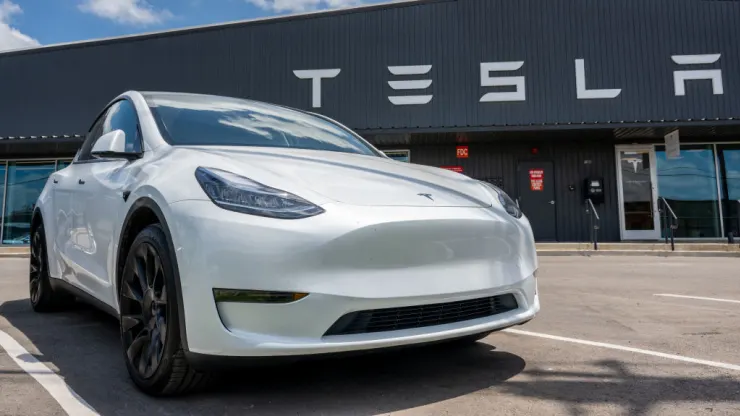
KEY POINTS
- Despite promises of increased production and sales, legacy automakers have had minimal impact on the electric vehicle (EV) market.
- Hyundai Motor, along with Kia, surpassed GM in EV sales in the United States, but still lags far behind industry frontrunner Tesla.
- According to data from Motor Intelligence, Tesla, under the leadership of CEO Elon Musk, has extended its lead over traditional automakers with approximately 300,000 all-electric vehicles sold.

Source – Getty Images
DETROIT – Despite promises of significant increases in production and sales of electric vehicles (EVs) from legacy automakers, the impact on the rapidly growing market has been minimal.
Tesla, the industry leader, maintains its top position in EV sales and has further extended its lead over traditional automakers. According to Motor Intelligence, Tesla has a lead of approximately 300,000 units over its closest competitors, Hyundai Motor and General Motors, in the first half of this year. This is a significant increase from the 225,000-unit gap observed in the first half of 2022.
Although Tesla does not disclose regional sales figures, it is estimated that the company sold around 336,892 vehicles to retail and fleet buyers in the U.S. during the first half of the year, marking a 30% increase compared to the previous year.
Meanwhile, Hyundai, including its subsidiary Kia, experienced an 11% growth in EV sales during the same period, reaching 38,457 units. General Motors, initially the second-largest EV seller in the first quarter, witnessed a more than fourfold increase in electric car and truck sales, totaling 36,322 units through June compared to the previous year. Volkswagen also saw significant growth, with EV sales more than doubling to 26,538 units sold through June.
Ford Motor, the second-largest EV seller after Tesla last year, secured the fifth position with sales of 25,709 vehicles through June. However, Ford’s EV sales only increased by 12% compared to the previous year, partly due to production downtime for plant retooling, including the Mexican facility producing the electric Mustang Mach-E crossover.
While Tesla experienced a 30% year-over-year sales growth in the first half of the year, the overall growth of the EV market has outpaced the company. Tesla’s market share of U.S. EV sales declined by nearly 10 percentage points from the previous year, now representing 60% of domestically sold electric vehicles, according to Motor Intelligence data.
Tesla’s loss in market share can be attributed to increased competition in the EV market, leading to overall market growth. EV sales in the U.S. rose by approximately 50% through June compared to the first half of 2022.
Legacy automakers, along with newer players like Rivian Automotive, have been striving to ramp up EV production. However, many of their outputs remain relatively small. Apart from the top contenders, only five other companies hold between 1% and 4% of the U.S. market share, while numerous others fall below 1%, as reported by Motor Intelligence.
On a global scale, Tesla delivered over 889,000 EVs during the first half of the year, including 466,140 vehicles in the second quarter. The company’s production is expected to continue growing, with a target of manufacturing at least 1.8 million electric vehicles in 2023.
Tesla’s CEO, Elon Musk, has expressed his belief that the Texas factory will become the highest-volume production auto plant in the U.S. once it reaches full capacity. Musk previously stated that the Texas plant aimed to produce half a million vehicles annually by the end of 2023.
Hyundai’s rise to the second-place position is noteworthy, particularly because its vehicles do not qualify for federal EV tax incentives, unless they are leased. These incentives, which are designed to benefit EVs produced in North America, do not currently apply to Hyundai’s imported EVs.
The South Korean automaker has capitalized on the leasing option, exploiting the leasing loophole under the Biden administration’s Inflation Reduction Act. Hyundai has increased the leasing of its EVs from around 2% at the beginning of the year to over 30% currently, as stated by Hyundai Motor America CEO Randy Parker.
Parker acknowledged the uneven playing field caused by the lack of federal tax incentives for Hyundai’s EVs, expressing the company’s efforts to navigate the circumstances as effectively as possible.
GM’s performance in EV sales has been disappointing, particularly regarding its new models featuring the “Ultium” battery technologies. The automaker has faced criticism for the slow ramp-up of production for its latest EVs, such as the GMC Hummer and Cadillac Lyriq.
During the first half of the year, the majority of GM’s EV sales were comprised of its outgoing Chevrolet Bolt models, which are slated to be discontinued later in the year.
GM CEO Mary Barra acknowledged at the recent Aspen Ideas Festival that the production of newer EVs has been constrained due to delays in domestic battery production.
Barra has expressed GM’s ambition to catch up to Tesla’s sales by the middle of the decade, as the company plans to introduce more mainstream EV launches later this year, including the Chevrolet Silverado, Blazer, and Equinox. Additionally, GM is preparing to launch a new electric delivery van and a luxury Cadillac EV called the Celestiq, with a price tag exceeding $300,000, in 2023.
The Detroit automaker has set a target to produce 150,000 EVs for the U.S. market this year.


